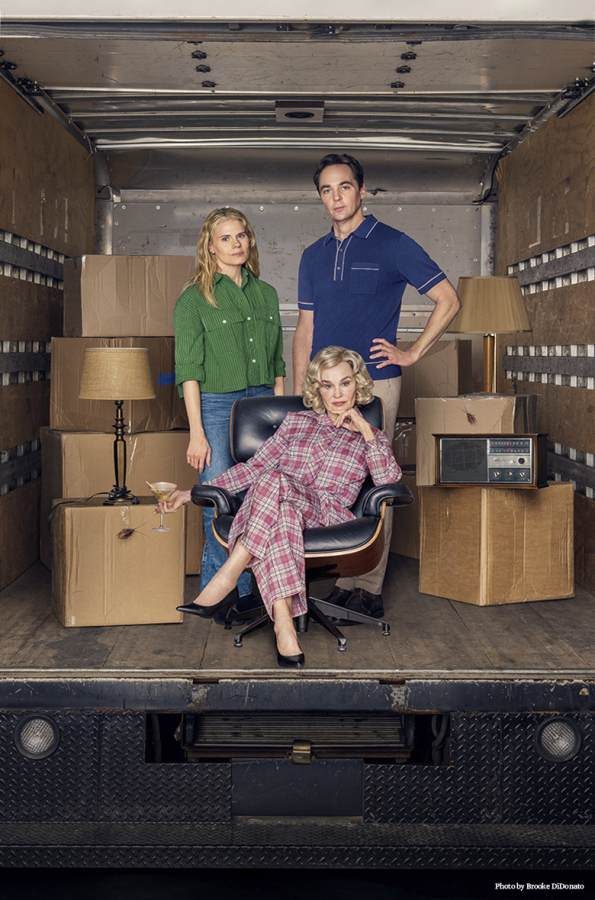

As we approach Mother's Day, it was fitting that two of the plays I saw this week had mothers as central characters, and they could not have been more different. “Mary Jane” is loving, self-sacrificing and always positive, while Phyliss in “Mother Play,” the new work by Paula Vogel (How I Learned to Drive,) is self-centered and bitter.
Directed by Tina Landau, the memory play begins with the narrator, grown-up Martha (Celia Keenan-Bolger) addressing the audience as she looks through a box of her deceased brother Carl’s things. Flashing back to 1962, she recalls the series of moves the family made after their father has abandoned them. To show the change in time and shift in their fortunes, Martha and Carl rearrange the furniture, reconfiguring it to ‘fit’ in their new space. (Scenic Design by David Zinn)
Subtitled “A Play in Five Evictions,” the play is cleverly divided into scenes in different apartments as the family has to keep moving. Once the dad has deserted them, Phyliss (Jessica Lange) must become the head of the household and raise her two teenage children, Carl (Jim Parsons) and Martha ((Celia Keenan-Bolger.) We suspend disbelief as we accept Keenan-Bolger and Parsons as high school students and 74 year old Lange as a 39 year old mother.
Vogel uses her own mother as inspiration and has Martha serve as the Vogel stand-in. I wonder how pleased her mother would have been to observe this characterization. Phyliss is the antithesis of a good mother, favoring one child over the other, constantly drinking, and feeling overwhelmed when Carl gets AIDS.
Phyliss is reminiscent of the controlling Amanda Wakefield in “Glass Menagerie,” directing her childrens’ lives through the prism of her own experiences. Thrown out by her parents for becoming pregnant, Phyliss married Carl’s abusive father but later admitted to Martha that she didn't want to be a mother.
Phyliss obviously favors Carl, her brilliant though decidedly effeminate son. She only barely pays attention to Martha except to order her around. She embraces Carl but barely makes physical contact with Martha, who says she could be absent and no one would notice. Director Landau always keeps Martha somewhat upstage, so physically she remains in the background.
It’s hard not to feel for the child and to dislike the mother.
It’s Carl who keeps Martha connected to the family. Parsons overplays the homosexuality of his character but at times it adds humor to the play. He's the one who instructs Martha in how to dress and carry herself when she is molested by boys on the school bus. Carl is obviously ‘different’ and one wonders how he escaped from school unscathed Evictions and years later when he ‘reveals’ to his mother that he is gay, she is repelled by his announcement and kicks him out. How could Phyliss possibly be surprised? Then she demands that Martha sever all ties with him.
Parsons and Keenan-Bolger are good, and their relationship as brother and sister is touching. Lange does a fine job and the audience loved her, especially when she dances with her kids at a gay club. One later scene when she’s alone in an apartment depicts her loneliness, but the scene goes on too long and offers nothing new.
There’s much humor in “Mother Play,” some in unexpected places. Their first few apartments are in the basement, and Carl's job is to take out the garbage. Parson’s reaction to the smells is hilarious as is the infestation of projected roaches, which is shown on the walls of the set.
At the end, Martha becomes caretaker for her mother whose mind goes in and out. Despite the hostility and pain over the years, Martha is still there for her mother. It might surprise some in the audience after Phyliss’ ill-treatment of her, but perhaps the play is as much about a child’s love for her mother as it is about a mother’s love for her children.
Hayes Theater
240 West 44th Street
New York, NY 10036